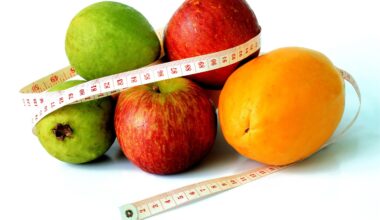Top Natural Remedies for Muscle Soreness After Home Workouts
Experiencing muscle soreness after a workout is a common issue many face, especially if you’ve pushed your limits at home. This discomfort, termed delayed onset muscle soreness (DOMS), typically follows intense physical activity. To ease muscle soreness, various natural remedies can offer relief. Staying hydrated plays a pivotal role; water helps to flush out toxins that accumulate in muscles during exercise. Another remedy to consider is applying cold therapy, like ice packs, which can reduce inflammation and numb sharp pain. Epsom salt baths are also popular; magnesium sulfate may aid in muscle relaxation and alleviate soreness. Gentle stretching exercises post-workout help in maintaining flexibility and preventing stiffness. Incorporating foods rich in antioxidants and omega-3 fatty acids, such as berries and fish, can further support your recovery process. Moreover, turmeric and ginger are known for their anti-inflammatory properties. Rest and listen to your body—sometimes, the best remedy is simply allowing time for recovery. By integrating these techniques, you can significantly improve your post-workout recovery experience.
Another effective approach to manage muscle soreness is through the use of heat therapy. Applying heat can enhance blood circulation in sore areas, allowing for increased oxygen and nutrients to effectively reach the muscles. You might opt for a warm towel compress or a heating pad, especially beneficial when soreness persists into the next day. Following workouts with proper nutrition is crucial—ensure you’re consuming protein-rich foods to help repair and rebuild muscle fibers. Additionally, consider the incorporation of recovery drinks that contain electrolytes and protein. This boosts your recovery by replenishing what your body loses during workouts. Furthermore, massaging sore muscles can help release tension and improve circulation. You can use hands or foam rollers for self-myofascial release. Yoga and body workouts focused on flexibility are excellent for reducing muscle strain and tightness. While muscle soreness can feel discouraging, it’s typically a sign that your muscles are adapting and becoming stronger. Remember not to push through extreme pain; balancing effort and recovery can enhance your fitness journey significantly.
Herbal Teas for Recovery
For those looking to explore holistic approaches for post-workout recovery, herbal teas can also play a significant part in decreasing muscle discomfort. Certain herbs are renowned for their healing properties. Ginger tea, for example, has been widely studied for its anti-inflammatory benefits, making it a great option after intense workouts. Another excellent choice is chamomile tea, known to promote relaxation and soothe muscle tension. The anti-inflammatory compounds in chamomile can assist in reducing soreness. Additionally, green tea is packed with antioxidants, helping to combat oxidative stress caused by intense exercise. Brew a pot post-workout to reap its benefits. Another herbal infusion worth considering is peppermint tea, which can aid digestion and help alleviate soreness. Sweetening your tea with natural honey can improve taste while providing added health benefits. You might also explore herbal tea blends designed specifically for muscle recovery, often found at health food stores. Sip on these teas throughout the day to enjoy their cumulative benefits, enhancing your overall recovery process after home workouts.
Listening to your body is essential after physical exertion, and proactive steps can aid recovery. One vital component is active recovery—this refers to light exercises like walking or cycling at a low intensity. Engaging in active recovery helps maintain blood flow, reducing stiffness while not overexerting the muscles. Engaging in activities like swimming can be particularly soothing. In addition, focus on adequate protein intake; pairing proteins with carbohydrates after a workout can greatly facilitate muscle recovery, particularly if consumed within the hour post-exercise. Foods such as chicken, eggs, legumes, and quinoa are excellent sources. Experimenting with different meal combinations can tailor your diet for optimal recovery; understanding how your body responds helps refine your family plan. Keep in mind that adequate sleep is equally vital for recovery. During sleep, your body undergoes essential repair processes, producing growth hormones crucial for muscle recovery. Develop a regular sleep schedule, ensuring you get quality rest. Using techniques such as sleep meditation can also promote deeper sleep, aiding in physical recovery from muscle soreness effectively.
The Importance of Hydration
Staying hydrated is not only beneficial during workouts but also plays a critical role afterward in alleviating soreness. Water enables the transportation of nutrients to your muscles, ensuring their recovery and reducing inflammation. Dehydration can exacerbate soreness and prolong recovery, so make it a goal to drink sufficient water before, during, and after workouts. An effective strategy is to infuse water with electrolytes, such as coconut water, which helps restore necessary mineral balance after sweat loss. You can also incorporate drinks like sports drinks in moderation; however, pay attention to sugar content. Drinking herbal teas or broths can enhance your hydration strategy while providing additional nutrients. Furthermore, watching the signs of dehydration, like dark urine or fatigue, can guide your hydration efforts. Set reminders to drink water throughout the day—carrying a water bottle can achieve this. Incorporating hydration-rich foods like cucumbers, watermelons, and oranges can also help with overall fluid intake. Prioritize hydration as an integral part of your recovery plan to combat muscle soreness effectively.
In concluding, muscle soreness is a typical aspect of home workouts, but there are various effective ways to manage and mitigate it. Combining the natural remedies discussed can lead to improved recovery experiences. It’s essential to remain patient and listen to your body’s signals throughout the recovery process. Recovery techniques should be personalized; consider what remedies work best for you. Some may prefer hot baths while others appreciate cold treatments. Similarly, dietary approaches may need tailor-fitting to individual preferences and reactions to specific foods. Explore and experiment with herbal options, teas, and nutrition plans that feel right. Employing active recovery and proper hydration are empowering practices that complement your fitness journey as well. Above all, consider maintaining balance between challenging your limits and allowing your body necessary recovery time. Keeping an open dialogue with your body about its reactions helps enhance future workouts, improve performance, and decrease the likelihood of injuries. Through attentive care and supportive practices, muscle soreness can transform into a revitalizing experience instead of a discouraging barrier.
Finally, investing in a quality post-workout recovery routine can establish lasting benefits for your overall health and wellness. Emphasizing natural remedies not only supports muscle repair but also encourages mindfulness regarding body treatment. As your fitness journey progresses, integrating various techniques will be essential for long-term success. Do not hesitate to consult with fitness or health professionals for tailored advice, especially if soreness is persistent or severe. Your health fitness plans should adapt and evolve along with your goals and achievements. Often, balance is key, ensuring you place equal emphasis on pushing your body and allowing it adequate recovery. Gradually adjusting intensity levels in workouts helps to reduce the risk of repetitive strain or overuse injuries. Also, incorporating cross-training can help diversify your workouts and minimize muscle overuse in particular muscle groups. Finally, remember that muscle soreness is often a sign of growth but should not impede your overall physical activities. By utilizing natural remedies smartly and employing a holistic perspective on recovery, you can enjoy your home workouts more thoroughly, ultimately fostering a healthier lifestyle.
Embracing a holistic approach to wellness includes not just muscle recovery, but mental well-being as well. Client satisfaction with their recovery plan often stems from a feeling of empowerment in managing their muscle health. Gentle movements can significantly influence your mindset; incorporating restorative exercises such as Tai Chi or gentle yoga can be beneficial. Remember, resilience and strength build over time; nurturing your body through each stage is crucial. In summary, understanding your body while developing routines enriched with effective natural remedies can make your home workouts increasingly rewarding. Enjoy the process, appreciate the achievements, and stay informed about different ways to support your post-workout recovery. Utilize this knowledge to formulate a personalized recovery plan that promotes long-term muscle health. Be attentive, focused, and mindful as you navigate your path to fitness. Celebrate your workout milestones and victories while using muscle soreness as a cue for deeper self-care practices. By prioritizing your recovery as much as your workouts, you’ll enhance your physical performance and overall well-being, leading to continued motivation in your fitness journey.


